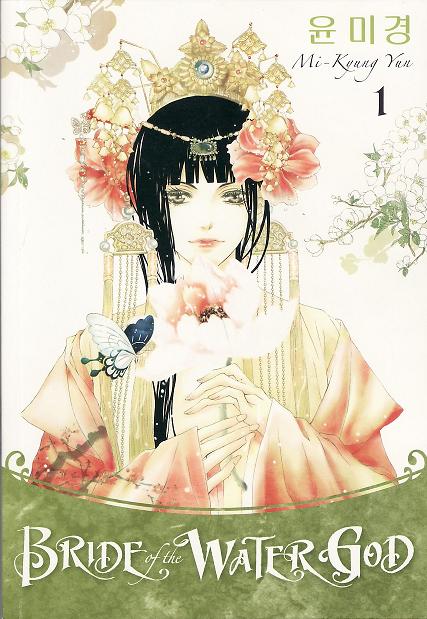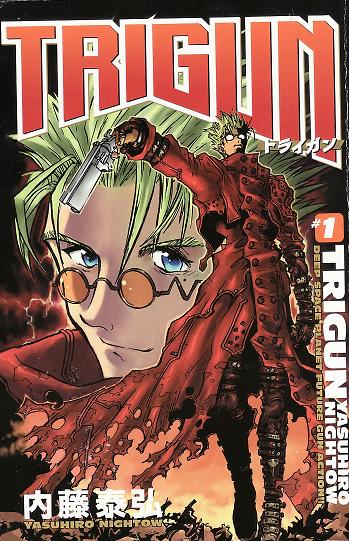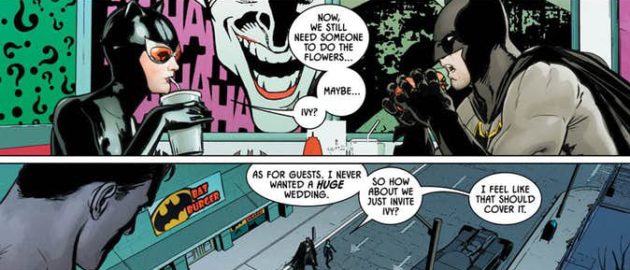 This week we have a special guest. Dark Horse Comics’ Director of Asian Licensing Michael Gombos was kind enough to exchange some emails with me, and answer several questions about the industry and his company. Dark Horse has been around for a while. The manga publishing division was founded back in 1988, when the company published Kazuhisa Iwata’s Godzilla. Only Viz Media has been publishing manga titles longer (1986) than Dark Horse, but Dark Horse is the oldest American publisher (Viz is owned by Japanese publishers Shogakukan and Shueisha). Their best selling title is the 28 volume Lone Wolf and Cub series, by Kazuo Koike (writer) and Goseki Kojima (art), which combined have sold over 1.2 million units (it’s actually Dark Horse’s best selling title overall, not just the top manga, which is incredibly impressive, though not too surprising, since it’s a fantastic series).
This week we have a special guest. Dark Horse Comics’ Director of Asian Licensing Michael Gombos was kind enough to exchange some emails with me, and answer several questions about the industry and his company. Dark Horse has been around for a while. The manga publishing division was founded back in 1988, when the company published Kazuhisa Iwata’s Godzilla. Only Viz Media has been publishing manga titles longer (1986) than Dark Horse, but Dark Horse is the oldest American publisher (Viz is owned by Japanese publishers Shogakukan and Shueisha). Their best selling title is the 28 volume Lone Wolf and Cub series, by Kazuo Koike (writer) and Goseki Kojima (art), which combined have sold over 1.2 million units (it’s actually Dark Horse’s best selling title overall, not just the top manga, which is incredibly impressive, though not too surprising, since it’s a fantastic series).
Michael has been with Dark Horse for about six years, and has handled Asian licensing since he began, gaining his current official title about 4 years ago. He started out as a Sales and Marketing Coordinator (for which he had to be able to speak, read, and write fluent Japanese!), moved up to Licensing Manager: Japan, and then to his current position.
[Thanks to Michael for providing this information on Dark Horse and his positions there.]
Now for the official questions:
Comic Attack: Please, introduce yourself!
Michael Gombos: I’m Michael Gombos, aged 33 years, born in Bakersfield, CA, and raised in West Linn, Oregon, via Tokyo and Osaka, Japan. Not sure what other details you’d like here; I like watching movies, reading, tabletop and MMO gaming.
CA: How does your company decide which titles it will license in America? Overseas popularity, fan suggestions, cross-marketing with anime titles, etc.?
MG: All of the factors you mention play into how we make our decisions. Ultimately, though, as Dark Horse Comics, Inc., is solely owned by Mike Richardson, the final decision lies with him. We do have a “manga team,” of sorts, who are responsible for bringing titles to the table, and then sharing said titles with the other people on the committee. We’ll talk about the strengths of each title, how’d we publish it (format, etc.) and when, and why it’d make sense for us to do (or not to do) that particular title.
CA: Your company publishes both Japanese and Korean titles. Is one easier to work with than the other? [Note: Bride of the Water God and Shaman Warrior are two excellent Korean titles published by Dark Horse in their original format.]
MG: I suppose you mean Korean and Japanese publishers, and to be honest, there is a specific and individual level of difficulty for every publisher in any country. I think that the Korean publishers tend to be more progressive and outgoing in their outbound licensing; that is, there was a time where (it felt like) every single Japanese title coming out was being licensed. Naturally, the marketplace couldn’t sustain a constant stream of mediocrity (and crashed under that), but this meant that many Japanese publishers didn’t have to be aggressive selling their titles: certain American publishers would be lined up at their door ready-to-buy. Korea, on the other hand, didn’t have that element, and Korean publishers tended to be more aggressive and out-and-about at trade shows, and actively attempting to sell the rights to their entertainment properties. They want to see their properties published and want to see royalty checks, so for the most part, it is quite easy to work with Korean publishers.
By the same token, many of our relationships with Korean publishers are pretty new, and a lot of our relationships with Japanese publishers stretch back over two decades, and there is a pretty durable framework for our relationships. Every relationship is very unique, and as with maintaining a good relationship with anyone (personal and professional), nothing is really easy. However, having lived a long time, and attended university in Japan, I feel quite at home working with Japanese publishers.
I think that one of the reasons DH has some great Korean titles (both in terms of being critical successes, and commercially viable) is that we branded Korean manhwa as manhwa. We think that our readers will notice that it’s not from Japan (and by the way, there is no such thing as a “manga” style, but that’s a whole different story).
On that note, manga is done for the Japanese market. Manhwa are comics done for the Korean market. If you’re drawing a book for the American market published via an American publisher, sorry, but that’s not manga.
 CA: Are you provided with translations, or do you translate everything in house?
CA: Are you provided with translations, or do you translate everything in house?
MG: When you ask, “provided with translations,” I am guessing that you mean “provided by the licensor,” and as far as I know, this never, ever happens. All of our books are translated by freelancers, with the occasional book being translated in house by me (an example being, Neon Genesis Evangelion: The Ikari Shinji Raising Project) but translation, lettering, etc., are all outsourced to professional freelancers.
CA: Could you discuss your co-publishing relationship with Digital Manga Publishing? Which company takes care of which aspects? [Includes Vampire Hunter D and Hellsing.]
MG: It’s a business relationship, so there isn’t much that I can go in to in detail. The processes that are handled vary on a title-by-title basis. One some times, they handle the editing and bookmapping, etc., and we handle it on other titles.
CA: Can you tell us a bit about the marketing process? Where do you do most of your advertising, which titles do you push the most, etc.?
MG: Truthfully, I am fairly divorced from the marketing process, but this is probably a good thing. Being in licensing, if I were empowered to make marketing decisions, I’m pretty sure you could guess where I’d allot DH marketing money.
CA: Both Tokyopop and Viz Media have increased their prices recently (by about a dollar; TP’s now average $10.99, while Viz’s average $9.99, for standard volumes). Could you tell us about Dark Horse’s pricing structure for manga titles?
MG: There is only price structuring at the series level for DH manga. Coincidentally, many different series might have the same pricing, but the pricing it generally set title-by-title. Unlike other companies, we don’t have a cookie-cutter format, and thus, a standardized price.
You will find consistent pricing on a particular series, but every series is looked at as an individual. Essentially, our pricing runs the gamut from $9.99 to $13.99 for standard manga TPB formatting, and a little more expensive for larger/thicker titles.
CA: What is the typical release schedule for most titles? For example, are series titles published every six months (or any set number)?
MG: Again, this varies on a title-by-title basis, but there can be occasional and further variation within each title. For example, for longer series, we tend to go with a bi-monthly schedule. This is the case in Berserk and GANTZ. Berserk was a longer series, and when the decision was made, had we kept to the quarterly schedule, it would have taken seven years to catch up with Japan; expedition of publication schedule was necessary.
For the most part, we can’t license a title until the TPB comes out in Japan. That’s why it seemed like there was a delay between the Japanese release of say, Hellsing, and the English-language release. There was nearly a two year gap (in Japan) between Hellsing 7 and 8, and we could only get started once the TPB came out, which means at least 7 months between the moment the contract is signed at the moment it’s on shelves. We received a lot of angry e-mail from fans who thought they’d been stymied and that there was some conspiracy or something, but that simply wasn’t the case.
CA: Recently, Tokyopop has brought up the idea of using fan scanners to help with translations (in part due to Crunchyroll.com’s move from a fansub site to a legitimate site, but currently only as an option for on hiatus, slow selling titles). Is this an idea that Dark Horse has considered?
MG: While this is good for publicity (most folks in the industry have heard of it, and hey, we’re now discussing it in this interview), and a way to save a lot of money on projects (let us use your translation, and get your name in a book!), it’s not something that Dark Horse is considering. Dark Horse prides itself on the its quality. Every book feels like a different book, not only because of the content inside, but because we pay close attention to whether or not the book has good hand, and feels like it should read — every series is an individual. We don’t pull punches when it comes to translation and adaptation, either. Indeed, translation is one of a few key elements that are absolutely instrumental to success. We hire the best translators that show skill or expertise in a certain series or genre.
Dark Horse has been flourishing with its manga the last year or so, because rather than publish everything with open rights, we stuck to a smaller amount of series and now this is paying off in rich dividends. As a percentage, DH’s titles saw the lowest percentage drop in “disappearance from shelves.” We’d rather have 10 strong titles and keep them alive in the marketplace (and that will thrive on their own right, as they are genuinely good series), than 20 strong titles and 200 “dogs.” I attribute this not only to the high quality of the titles but the high production values, as well; readers get a book that is unique to the series. Everything has been hand selected for that particular series, as there is not “Let’s just go “Trigun” format on this one,” or whatever. Is there a cheaper paper to print on? Sure. Can we omit lots of color pages? We could. Can we find fans to translate for free, to minimize cost? We sure can. Quite simply, DH is not in a race to find the lowest common denominator. Specific titles might cost a dollar or two more, but you’ll understand the difference when you pick up that title.
CA: What is your company’s stance on fan scanlations (unauthorized fan projects, where foreign language titles are scanned and translated by fans and posted online)?
MG: I think our stance would fall into congruence with American copyright law: It’s illegal. If DH purchases the exclusive rights to translate, publish and distribute a certain property, people who post scanlations are not only in violation of copyright infringement, but they’re also hurting the marketplace in general. I do realize that some series that DH publishes garnered a lot of popularity as they were scanlated a while back, but the only way we can continue to bring great series to the English language audiences are if we sell books and send the licensors royalty checks. You can talk all you want about certain awards a series has received, but the only way they’re gauging success in Japan in Korea is via red or black ink.
 CA: Dark Horse has a presence at conventions like Wizard World and Comic Con, but do they have a presence at (strictly) anime conventions (like A-Kon or Anime Expo)?
CA: Dark Horse has a presence at conventions like Wizard World and Comic Con, but do they have a presence at (strictly) anime conventions (like A-Kon or Anime Expo)?
MG: The last year has been a tight year for the industry, so we really did have to scale-back in general, in terms of convention presence. However, we’re usually a regular at Anime Expo, Sakura-Con and Kumori-Con, and have had a booth at the NYAF before, as well. Industry legend and Dark Horse Manga Editor Extraordinaire, Carl Horn, is a guest of most of the major conventions, and is away from Portland many weekends of the year!
CA: About how many manga titles are you currently publishing?
MG: We currently have 12 on-going series. Next year, there will be about 75 volumes published across around a dozen-or-so series. This could fluctuate toward more books, since there could potentially be deals made tomorrow that would appear next Christmas — you never know!
CA: Are there any upcoming releases you would like to talk about?
MG: I could talk at extreme length about any and all of our upcoming (and current) releases. I’m genuinely excited about all of our projects, as I am the one orchestrating the deal. I am really enjoying working with Carl on our CLAMP re-releases/omnibus series. Next up on the list is CHOBITS, and aside from being an extremely enjoyable title, I am also looking forward to the new and improved format for CHOBITS. Naturally, the last volume of Hellsing is something that I have high expectations for.
[Note: Tokyopop originally had the license for Chobits; Dark Horse will take over with the license in January with their omnibus releases.]
CA: Hellsing has reached its final volume (releasing in April). Do you have any titles in mind to replace it?
MG: Hellsing will be a difficult title to replace, and we usually don’t have an “intentional replacement” for any series. There are new series that will serve as “schedule replacements,” but there won’t be a “replacement in spirit,” for Hellsing, if that’s what you mean.
CA: Do you have a favorite title? Personally, I loved the Trigun books.
MG: I will assume you’re referring to DH titles, so I’ll go with that (let me know if you mean in general: Deb Aoki actually did an article on this).
I have a lot personally invested in GANTZ, as that series took a tremendous amount of time and effort to acquire. It helps that I am a big fan of the series, too! Aside from GANTZ, I’d say Reiko the Zombie Shop or Hellsing.
____________________________________________________________________________________
I would like to say a huge thank you to Michael for taking the time to answer my emails, and for giving such thorough responses. I hope you all enjoyed this glimpse into Dark Horse’s manga division, and learned a little something about the industry, like I did. Good luck to Michael and Dark Horse and they continue to publish more excellent titles.
Kris
kristin@comicattack.net
[Covers scanned from my personal copies, interiew completed via email.]



Very informative Kristin, thank you for getting this out there!
This was a crazy quote, ” If you’re drawing a book for the American market published via an American publisher, sorry, but that’s not manga.” Woah!!
Well, technically speaking, by its definition, it’s not manga. By definition, manga are Japanese comics.
For example, you wouldn’t call the Teen Titans cartoon anime, just because it imitates anime. It’s an American made cartoon, for American audiences.
Nice interview!
Pingback: Manhwa Monday: A New Year! | Manga Bookshelf
If Dark Horse stands behind all their titles why did they seemingly stop publishing Translucent? That was dissapointing.
I love the fact that DH pays so much attention to translation and adaptation details. I’m a big fan of The Kurosagi Corpse Delivery Service, and every time I purchase a volume, I feel like I’m getting a bonus book in Carl Horn’s extensive translation notes/commentary section. I already preordered vol 10! Great job, DH!
Pingback: Jason Thompson, Mike Gombos, and Dan Hipp walk into a blog post… « MangaBlog
Pingback: Jason Thompson, Mike Gombos, and Dan Hipp walk into a blog post… | Anime Blog Online